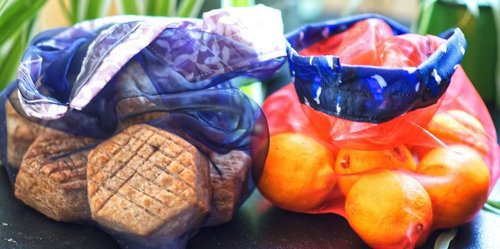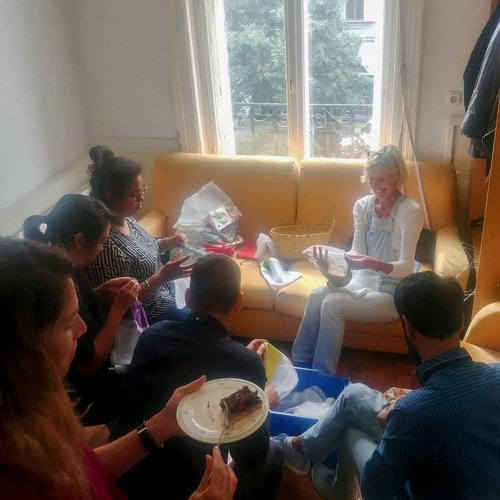"One could claim that Kalunba’s mission has nothing very much to do with environmental protection. And one would be right. But yet, all of us working at Kalunba seem to share an interest in and enthusiasm for finding ways to reuse and recycle what we can." An eco-friendly project of the Refugee Integration Ministry of RCH.

We fairly regularly receive clothes donations, which is of great help, but there are always things that do not get picked up and we do not have enough storage space to keep clothes that are not seasonally appropriate.
Sometime in the spring, we looked over the once-again-messy donations’ room, and the idea came: Why don’t we use the material from the leftover clothes to create pretty, zero-waste shopping bags to replace the characterless single-use plastic bags found in most shops? We could do this with refugees’ help, many of whom know how to sew. Women, who are often isolated, could use their talents and spend quality time in a friendly community. Sewing is not only a potentially healing and creative activity but, with some luck, it can also be a source of income.
The Refugee Ministry of the Reformed Church in Hungary is organized under the Unit for Refugee Integration, which is part of the RCH’s Diaconal Office and works with Kalunba Social Services Nonprofit Ltd. as implementing partner.
Both the Eco Congregation Movement and Green Peace were very supportive of our initiative: they ordered hundreds of bags. We also sold the bags at Szimpla Slow Lifestyle Market (see the photo here) and at a youth festival, organised by the Reformed Church in Hungary. Encouraged by the success of our bags, we even approached a number of eco-friendly designers and are especially grateful for Botanika for all their help, new designs, patience and great ideas.
Putting strings in bags did not seem to require either very much talent or creativity, so one day, I grabbed some bags, sat down with them on the sofa and got to work. It did not take long before colleagues started gathering around me on the sofa, some of them sacrificing their lunchbreaks. Everyone wanted to do some bags. “Women working together in the spinning room or at corn husking time must have felt like that,” we said laughing. Except that we were not only women. The men joined us too and while the womenfolk obediently employed the traditional method of using a pin to string our bags, the menfolk spared neither trouble nor time to invent faster and simpler methods. It very much seemed like it was not only refugee women who liked to feel useful and spend time in a friendly community.

Written by Ágnes Székely
Originally published on the website of Kalunba